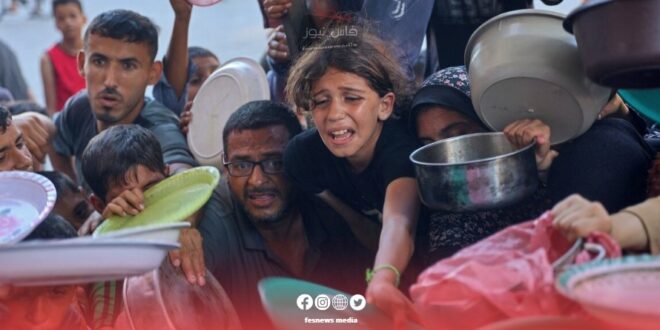As the war in the Gaza Strip enters its tenth month, fears of a severe health and environmental crisis threatening the besieged population are escalating. According to a report published on Thursday by the Dutch non-governmental organization “PAX”, the Gaza Strip is now “drowning” under a mountain of waste and debris, which has become a source of diseases and pollution.
Oum Nahed Abu Shar, a 45-year-old mother living in a displaced persons camp in Deir al-Balah in central Gaza, says, “We are only suffering, not living.” She adds, “The heat, diseases, flies, and mosquitoes… all of this is harming us.” She indicates that they can no longer sleep at night due to the smell of sewage, as pumping stations stopped working on Tuesday due to lack of fuel.
In the exhausted Gaza Strip, which has been deprived of electricity supplies for nine months due to the Israeli siege, the municipality fears a “health and environmental catastrophe” threatening more than 700,000 people. On Thursday evening, the Ministry of Health in the Hamas government in Gaza announced the detection of poliovirus in wastewater samples, in coordination with UNICEF.
According to a report published by Oxfam on Thursday, the amount of water available in Gaza has decreased by 94% since October 7, the date the war began. The organization accuses Israel of using water as a “weapon of war”, causing a “deadly health catastrophe”. The amount of water available per person in Gaza has become only 4.74 liters per day, which is “less than a third of the minimum recommended amount in emergency situations.”
PAX warns of the formation of a “chemical soup” resulting from the accumulation of heavy metals from repeated bombings, which may eventually contaminate groundwater and soil. The organization anticipates that if the danger is imminent for Gaza, the entire region may soon face serious problems in ecosystems and public health.
Amid these difficult conditions, Gaza’s residents continue to suffer from hunger and infectious diseases, with increasing risks of scabies, chickenpox, skin rashes, and lice infestation, according to doctors in the field.
 فاس نيوز ميديا جريدة الكترونية جهوية تعنى بشؤون و أخبار جهة فاس مكناس – متجددة على مدار الساعة
فاس نيوز ميديا جريدة الكترونية جهوية تعنى بشؤون و أخبار جهة فاس مكناس – متجددة على مدار الساعة








 China Assures EU: We Have Tools to Offset Economic Turbulence Amid Tensions with Washington
China Assures EU: We Have Tools to Offset Economic Turbulence Amid Tensions with Washington



